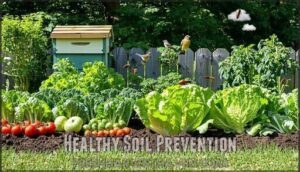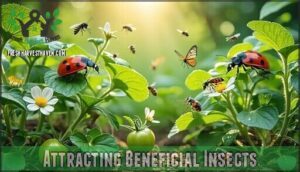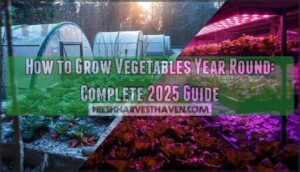This site is supported by our readers. We may earn a commission, at no cost to you, if you purchase through links.
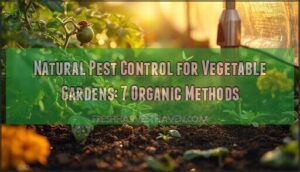 You can protect your vegetable garden from pests without harmful chemicals by combining several natural pest control for vegetable gardens strategies.
You can protect your vegetable garden from pests without harmful chemicals by combining several natural pest control for vegetable gardens strategies.
Start with organic sprays like neem oil or spinosad that target specific insects while leaving beneficial bugs unharmed.
Build healthy soil through composting and natural fertilizers—strong plants naturally resist pest attacks better than weak ones.
Install physical barriers like row covers, mesh fabric, or copper strips to keep unwanted visitors out.
Attract beneficial insects by planting flowers they love and creating habitats where they’ll stick around to patrol your crops.
These methods work like nature’s own security system, each one strengthening the others to create an invisible shield around your vegetables.
Table Of Contents
- Key Takeaways
- Natural Pest Control Methods
- Healthy Soil Prevention
- Physical Barriers Control
- Attracting Beneficial Insects
- Frequently Asked Questions (FAQs)
- What is the best natural pest control for vegetable gardens?
- How do I keep bugs out of my vegetable garden naturally?
- Does vinegar keep bugs off vegetable plants?
- What is the best natural pesticide for vegetable gardens?
- What home remedy kills bugs in a vegetable garden?
- How do I keep my vegetable garden pest free?
- How do I get rid of bugs in my vegetable garden naturally?
- What is the best pest control for vegetable gardens?
- What is a natural pesticide for vegetable gardens?
- How do you control insect pests in a vegetable garden?
- Conclusion
Key Takeaways
- You’ll create multiple defense layers by combining organic sprays, physical barriers, healthy soil, and beneficial insects rather than relying on any single method
- You can use targeted organic sprays like neem oil, spinosad, and pyrethrin that kill harmful pests while protecting beneficial insects when applied during evening hours
- You’ll build natural pest resistance through composting, organic fertilizers, and proper soil aeration that strengthen plants from the ground up
- You can attract nature’s pest controllers by planting flowers like sweet alyssum and yarrow, creating insect habitats, and encouraging birds that eat thousands of pests weekly
Natural Pest Control Methods
You don’t need harsh chemicals to protect your vegetables from hungry pests.
These four organic sprays and powders work naturally to control insects while keeping your garden safe for beneficial bugs and your family.
1. Organic Spinosad Garden Insect Spray
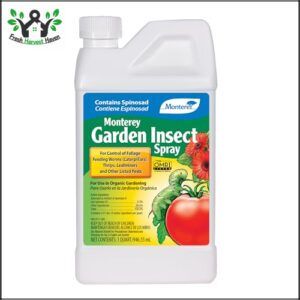
One powerful weapon against vegetable garden pests comes from nature itself: Spinosad, an organic pesticide derived from soil bacteria that effectively targets troublesome insects while protecting beneficial ones.
This natural pest control solution offers excellent Pest Spectrum coverage and superior Resistance Management compared to synthetic alternatives.
Spinosad Application provides several advantages for organic pest control:
Nature’s own pest fighter – spinosad targets harmful insects while protecting the good guys.
- Targets major vegetable garden pests including caterpillars, thrips, leafminers, and beetles through contact and ingestion
- Ensures Pollinator Safety when applied during evening hours after bee activity decreases
- Available in multiple Formulation Types including liquid concentrates and ready-to-use sprays for convenience
- Remains effective for 3-4 weeks with proper application timing and weather conditions
- OMRI-listed for organic gardening with minimal environmental impact compared to synthetic organic pesticides
Apply this natural solution in late afternoon for best results while maintaining your garden’s ecological balance.
2. Natural Pyrethrin Insect Concentrate Spray
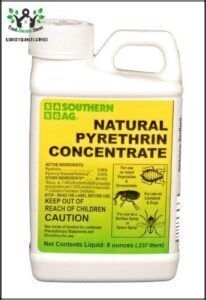
Pyrethrin application delivers nature’s fastest pest knockout, sourced from chrysanthemum flowers for effective natural pest control.
You’ll see quick action against vegetable garden pests within minutes of contact.
This organic pest control method offers excellent mammalian safety, making it perfect for indoor use around families and pets.
Effective organic pest control methods like pyrethrin are essential for maintaining a healthy garden ecosystem.
Natural pesticides like pyrethrin work best when applied during cooler evening hours to protect beneficial pollinators while maximizing effectiveness.
They provide a quick action against pests, making them a valuable tool for gardeners.
3. Neem Oil Spray for Plants
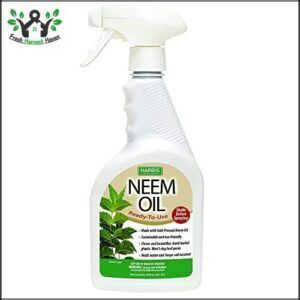
Extracting neem oil benefits from nature’s pharmacy transforms your garden into a pest-resistant haven. This organic spray disrupts insect hormone systems while protecting beneficial pollinators when applied correctly.
Here’s your neem application strategy:
- Mix 2 teaspoons neem oil with 1 quart water plus dish soap
- Apply during evening hours to prevent leaf burn
- Reapply every 7-10 days for consistent oil efficacy
- Target aphids, whiteflies, and soft-bodied pests directly
This natural pest control method outperforms harsh chemicals.
4. Diatomaceous Earth Natural Pest Control Powder
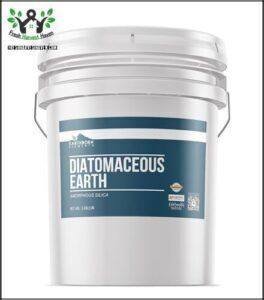
Diatomaceous Earth acts like microscopic armor for your garden. This Pest Powder from fossilized algae creates razor-sharp barriers that slice through soft-bodied insects while staying completely safe for you and your family.
| Application Method | Target Pests | Reapplication Needed |
|---|---|---|
| Light dusting around plants | Slugs, beetles, crawling insects | After rain or watering |
| Ring around garden beds | Ants, earwigs, cutworms | Weekly during active season |
| Direct on affected leaves | Aphids, spider mites, thrips | Every 3-5 days until controlled |
| Soil surface treatment | Grubs, soil-dwelling larvae | Monthly maintenance |
| Container garden barriers | Scale insects, mealybugs | Bi-weekly refresh needed |
This Natural Repellent won’t harm earthworms or beneficial insects. Earth Benefits include long-lasting organic pest control that doesn’t build resistance like chemical alternatives.
Healthy Soil Prevention
Strong soil builds strong plants that naturally resist pests and diseases.
You’ll create a foundation for healthy vegetables while reducing the need for pest treatments when you focus on soil health first.
Benefits of Composting
While natural sprays handle immediate threats, composting builds your garden’s long-term defense system. This organic pest control method transforms kitchen scraps into soil gold that strengthens plants from the ground up.
Compost Tea feeds beneficial microorganisms that crowd out harmful pathogens, while Carbon Sequestration improves soil structure. Microbe Growth creates a thriving underground ecosystem where beneficial insects flourish. Enhanced Nutrient Cycling means your vegetables can better resist pest attacks naturally.
Picture your compost pile as:
- A microscopic army headquarters where good bacteria strategize
- An underground buffet feeding earthworms and Soil Biota
- A natural pharmacy brewing disease-fighting compounds
- Your garden’s insurance policy against future pest invasions
This integrated pest management approach reduces chemical fertilizer needs by 40-60% while cutting irrigation requirements substantially through improved water retention. Using a compost tea brewer can help optimize the process of creating this liquid gold.
Natural Fertilizers for Soil Health
Beyond the basics of composting, organic fertilizers transform your garden into a pest-resistant fortress by building robust soil health from the ground up.
When you feed your soil properly, you’re creating an ecosystem where plants develop natural defenses against pests and diseases.
They also help improve long-term soil health.
Here are five powerhouse organic amendments that boost plant nutrition and plant health:
- Worm Castings – Slow-release nutrients that improve soil structure and water retention
- Compost Tea – Living liquid fertilizer packed with beneficial microorganisms
- Bone Meal – High-phosphorus powerhouse for strong root development and flowering
- Green Manure – Cover crops that add nitrogen when tilled into soil
- Rock Phosphate – Long-term phosphorus source for sustained plant nutrition
These organic fertilizers work synergistically to create healthy soil that naturally suppresses pests while nourishing your vegetables.
Preserving Soil Structure With Aeration
Building on proper fertilization, compacted soil becomes pest central. Aeration benefits your garden by breaking up hard-packed earth that suffocates roots and invites trouble. Compaction prevention starts with simple tools like garden forks creating oxygen pathways.
| Method | Frequency | Best Timing |
|---|---|---|
| Manual forking | 2x yearly | Early spring/fall |
| Amendment incorporation | Seasonal | Before planting |
| Mulch application | Ongoing | Year-round |
| Core aeration | As needed | Moist conditions |
Smart tillage practices avoid overworking soil while soil organisms like earthworms naturally tunnel through loose earth. This organic gardening approach strengthens your garden ecosystem where healthy soil health equals fewer pests—no chemicals required for effective natural pest control.
Regular soil aeration techniques can improve the overall health of your garden.
Avoiding Chemicals That Harm Beneficial Organisms
Instead of reaching for chemical pesticides that devastate your garden’s biological balance, choose eco friendly organic methods that preserve beneficial insects.
Chemical pesticides kill indiscriminately, wiping out helpful predators alongside pests.
Here’s what thrives when you avoid harmful chemicals:
- Ladybugs and lacewings control aphid populations naturally
- Ground beetles patrol your garden, eating cutworms and grubs
- Parasitic wasps target hornworms and other damaging caterpillars
- Pollinators maintain strong vegetable production through natural pest control
- Soil microorganisms continue building pest resistance through companion planting and natural remedies like neem oil
By maintaining healthy soil structure, gardeners can create an environment that supports these beneficial organisms.
Physical Barriers Control
Physical barriers offer some of the most effective protection against garden pests without using chemicals.
You can block insects from reaching your plants with simple materials like mesh fabric, row covers, copper tape, and protective bags that let your vegetables grow safely while keeping harmful bugs away, using physical barriers.
Using Garden Mesh Fabric
Garden mesh fabric creates an effective protective bubble around your vegetables without blocking sunlight, water, or air circulation.
These Fabric Row Covers act like invisible armor against pests while maintaining ideal growing conditions.
Mesh Size Options vary from fine weaves that stop tiny aphids to medium meshes perfect for larger insects.
Garden Netting made from lightweight materials like spun-bonded polypropylene offers excellent Pest Barrier Materials for natural pest control.
Simply drape floating row covers over plants or secure with hoops for garden pest control that’s both gentle and highly effective against most pest management challenges.
The use of garden mesh materials is a key factor in determining the success of this method.
Installing Row Covers
Row covers create an effective pest barrier that shields your vegetables from hungry insects while allowing sunlight and water through. These floating row covers offer reliable crop protection when installed properly.
Follow these essential steps for successful installation:
- Select appropriate row cover materials – lightweight fabric for summer heat, heavier options for cooler weather
- Secure all edges firmly using soil guards or landscape pins to prevent pest entry
- Create adequate slack for plant growth and air circulation
- Install before pests arrive for maximum organic pest control effectiveness
Garden netting works best when applied early in the growing season. This proactive approach guarantees your vegetable pests can’t establish themselves, giving your crops the protection they need to thrive naturally. Understanding row cover options is vital for choosing the right materials for your garden.
Creating Copper Barriers
While row covers protect from airborne pests, copper barriers create an underground fortress against ground crawlers.
Copper tape generates a mild electric charge when it contacts slug mucus—imagine licking a battery terminal, but for slugs.
Copper installation requires 3+ inch wide strips around raised beds or containers.
Keep surfaces clean since dirt reduces effectiveness.
Laboratory studies show only 1 in 20 slugs crosses copper barriers successfully.
| Barrier Type | Best Application |
|---|---|
| Copper mesh | Large garden perimeters |
| Adhesive tape | Individual containers |
| Copper rings | Plant stem protection |
These slug deterrent methods work best combined with other natural pest control strategies.
Copper barriers offer long-lasting organic pest control without harming beneficial insects, making them perfect pest barriers for sustainable garden pest control.
Using Organza Bags for Fruit Protection
Beyond copper barriers that stop crawling pests, your developing fruits deserve their own personalized protection. Fruit bagging creates individual shields around vulnerable produce, keeping damage at bay.
These lightweight fruit covers transform garden pest management from reactive to proactive:
- Select bag materials sized 2-10 inches based on fruit variety
- Install fruit protection bags after pollination completes successfully
- Secure drawstrings tightly ensuring complete crop wrapping coverage
- Check periodically for proper fruit development and bag condition
- Clean and store bags for next season’s organic pest control efforts
This pest prevention method works like having tiny bodyguards stationed around each piece of fruit.
Unlike row covers that protect entire plant sections, organza bags provide targeted defense where you need it most.
You’ll find this approach particularly effective for tomatoes, grapes, and stone fruits that attract birds and insects during ripening.
Effective organic pest control methods can substantially reduce crop damage and increase yields.
Attracting Beneficial Insects
You can turn your vegetable garden into a natural pest control powerhouse by inviting beneficial insects to do the work for you.
These tiny allies like ladybugs, lacewings, and parasitic wasps will hunt down harmful pests while you focus on enjoying your harvest.
Planting Flowers That Attract Beneficial Insects
While physical barriers keep pests out, beneficial flowers transform your garden into nature’s recruitment center.
Sweet alyssum attracts hoverflies that devour aphids, while dill and yarrow draw hungry ladybugs with their flat blooms.
These pollinator plants serve as insect attractants that boost your natural pest control strategy.
Mix cosmos, calendula, and fennel throughout your vegetable rows—these garden companions create landing pads for beneficial insects.
Your flowers become bug magnets for the good guys, turning companion planting into an effective organic pest control system.
Providing Habitats for Insect Egg-Laying
Creating insect hotels and breeding grounds gives beneficial insects safe spaces for egg laying.
You’ll want to select diverse host plants that support complete lifecycles – think native wildflowers, herbs, and shrubs where natural predators can reproduce.
Leave small brush piles, hollow stems, and undisturbed soil patches as parasite habitats.
These sheltered areas become nurseries where helpful bugs raise their young, creating a self-sustaining army of garden defenders.
Avoiding Chemicals That Harm Beneficial Insects
Your beneficial insect allies need protection from harmful chemicals that don’t discriminate between pests and helpers. Integrated Pest Management focuses on preserving these garden warriors while controlling unwanted bugs.
Smart gardeners choose eco friendly methods that target specific problems without collateral damage:
- Apply organic insecticidal soap only to affected plant areas rather than spraying everything
- Time neem oil applications for evening hours when beneficial insects aren’t active
- Use natural repellents like companion planting to deter pests without toxic residues
- Create pesticide-free zones where predatory insects can establish colonies safely
- Test organic gardening solutions on small areas first to monitor beneficial insect activity
These natural pest control strategies maintain your garden’s ecological balance. When you avoid broad-spectrum chemicals, ladybugs, lacewings, and parasitic wasps stick around to handle pest problems naturally. By using natural pest control methods, gardeners can effectively manage pests without harming the environment.
Using Trap Crops for Natural Pest Control
Trap crops work like pest magnets, drawing harmful insects away from your valuable vegetables.
These biological traps function as natural lures, with blue Hubbard squash attracting cucumber beetles and nasturtiums pulling aphids from nearby crops.
Plant your pest decoy varieties two weeks before main crops to intercept insects early.
Dedicate 2-10% of garden space to these sacrificial plants for maximum effectiveness.
Combine trap crops with companion planting strategies, using flowers like calendula and sunflowers to create natural pest management zones.
Regular scouting prevents trap crops from becoming breeding grounds, while crop rotation disrupts pest cycles season after season.
Encouraging Wild Bug-Eating Birds
Beyond trap crops, you’ll want feathered allies patrolling your garden. Wild birds devour thousands of pests weekly, becoming your most effective natural predators. These aerial hunters target aphids, caterpillars, and beetles that damage vegetables.
Transform your space into a bird sanctuary:
- Install birdhouses and nesting boxes 15-20 feet from vegetable beds
- Add bird baths with fresh water to attract diverse species year-round
- Set up bird feeders with seeds to supplement their insect diet
- Create roosting sites using native shrubs where birds rest between hunting
Consider adding a bat box too—bats consume night-flying pests that birds miss. This approach creates a 24-hour pest control system using beneficial insects and natural predators working together.
Frequently Asked Questions (FAQs)
What is the best natural pest control for vegetable gardens?
Row covers and companion planting work best—they’ll block 70% of pest damage while attracting helpful predators.
You can also use neem oil for stubborn bugs and hand-pick larger pests like hornworms.
How do I keep bugs out of my vegetable garden naturally?
Use row covers, companion planting, and hand-picking to create natural barriers. Apply neem oil or insecticidal soap for soft-bodied pests, while encouraging beneficial insects like ladybugs naturally controls garden populations.
Does vinegar keep bugs off vegetable plants?
Vinegar can repel some bugs from your vegetable plants, but it’s not the most effective natural solution.
White vinegar disrupts certain insects’ scent trails and tastes, though it won’t eliminate infestations like specialized organic sprays.
What is the best natural pesticide for vegetable gardens?
Neem oil stands as your garden’s champion against pests.
It disrupts insect hormone systems while preventing powdery mildew.
Apply at night to protect beneficial pollinators and avoid plant damage from sun exposure.
What home remedy kills bugs in a vegetable garden?
DIY soap spray works wonders: mix one tablespoon mild dish soap with a quart of water.
You’ll knock out aphids, spider mites, and other soft-bodied pests on contact without harming your vegetables.
How do I keep my vegetable garden pest free?
While bugs wage war on your vegetables, you’re the general commanding a peaceful army.
Use row covers, companion planting, and beneficial insects like ladybugs.
Rotate crops annually and maintain garden hygiene to break pest cycles naturally, using methods like companion planting to ensure a healthy garden.
How do I get rid of bugs in my vegetable garden naturally?
Try companion planting with aromatic herbs like basil and marigolds to repel pests naturally. Use row covers, hand-pick larger insects, and spray neem oil at night for effective control.
What is the best pest control for vegetable gardens?
Managing unwelcome garden visitors requires a strategic approach combining prevention and targeted intervention.
Use row covers, companion planting, and beneficial insects like ladybugs. Apply neem oil or BT for specific pests.
Maintain garden hygiene and crop rotation to break pest cycles naturally, utilizing methods like companion planting.
What is a natural pesticide for vegetable gardens?
Neem oil extracted from neem seeds disrupts pest hormones and growth. BT spray targets caterpillars safely. Insecticidal soap kills soft-bodied pests on contact. These botanical solutions protect your vegetables naturally.
How do you control insect pests in a vegetable garden?
Row covers reduce pest damage by over 70% during early plant stages.
You’ll control insects by using physical barriers like row covers, companion planting with pest-repelling herbs, attracting beneficial predators, and applying organic sprays when needed.
Conclusion
Testing the theory that chemicals are essential for pest control proves false when you implement natural pest control for vegetable gardens.
You’ve learned seven organic methods that work together like a complete ecosystem.
Start with organic sprays, build healthy soil, install physical barriers, and welcome beneficial insects.
These natural strategies protect your vegetables while keeping your family and environment safe from harmful toxins.

